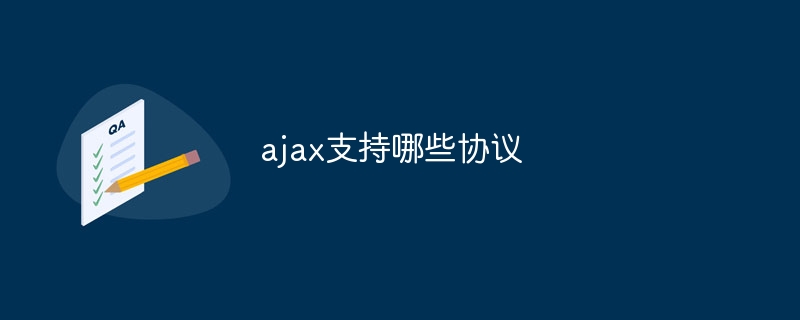Home >Web Front-end >Front-end Q&A >What protocols does ajax support?
What protocols does ajax support?
- 百草Original
- 2023-11-17 13:42:191560browse
The protocols supported by ajax include HTTP/HTTPS, XML, JSON, SOAP, REST, FTP and WebSockets, etc. Detailed introduction: 1. HTTP/HTTPS. HTTP is a protocol used to request and send web content from the server. HTTPS is a secure version of HTTP. It uses SSL/TLS protocol for encryption to ensure the security of data transmission; 2. XML, It is a format for storing and transmitting data. It uses tags to mark data and can be nested in other XML and so on.

The operating system for this tutorial: Windows 10 system, DELL G3 computer.
AJAX (Asynchronous JavaScript and XML) usually does not directly support specific protocols. It is a technology based on web standards that mainly relies on HTTP or HTTPS protocols to communicate with servers. However, AJAX can be used with other protocols to implement specific functionality or meet specific needs. The following are some common protocols used with AJAX:
1. HTTP/HTTPS: HTTP (Hypertext Transfer Protocol) is a protocol used to request and send web page content from the server. HTTPS (HTTP Secure) is a secure version of HTTP that uses the SSL/TLS protocol for encryption to ensure the security of data transmission. AJAX mainly uses HTTP or HTTPS protocols to send asynchronous requests and receive responses.
2. XML: XML (eXtensible Markup Language) is a format used to store and transmit data. It uses tags to mark data and can be nested within other XML documents. AJAX often uses XML format to send and receive data. By encapsulating data in XML format, AJAX can exchange data with the server without refreshing the page.
3. JSON: JSON (JavaScript Object Notation) is a lightweight data exchange format. It uses a subset of JavaScript syntax to represent data, including objects, arrays, and strings. AJAX often uses the JSON format to send and receive data because it is more concise and easier to process than XML, and interacts more naturally with JavaScript.
4. SOAP: SOAP (Simple Object Access Protocol) is an XML-based protocol used to exchange structured information in the network. It defines a set of specifications and standards that enable communication between different systems in a structured manner. Although SOAP itself is not part of AJAX, it can interact with SOAP services through AJAX technology to implement functions such as remote procedure calls (RPC).
5. REST: REST (Representational State Transfer) is a software architecture style based on the HTTP protocol. It emphasizes using different HTTP methods (such as GET, POST, PUT, DELETE, etc.) to operate resources to achieve a simple and scalable system design. AJAX is often used with RESTful APIs to communicate with the server over the HTTP protocol.
6. FTP: FTP (File Transfer Protocol) is a protocol used to transfer files on the network. Although AJAX itself does not support the FTP protocol, it can interact with the FTP server through other technologies (such as JavaScript's File API, FileReader, etc.) to implement functions such as file upload or download.
7. WebSockets: WebSockets is a technology that enables two-way communication. It allows establishing a persistent connection between the browser and the server and sending and receiving data through this connection. Although WebSockets are not part of AJAX, they work together to enable real-time communication between the browser and the server.
To summarize, AJAX is often used with protocols such as HTTP/HTTPS, XML, JSON, SOAP, REST, FTP and WebSockets to achieve asynchronous communication and data exchange. Which protocol to choose depends on the specific application scenario and requirements.
The above is the detailed content of What protocols does ajax support?. For more information, please follow other related articles on the PHP Chinese website!

